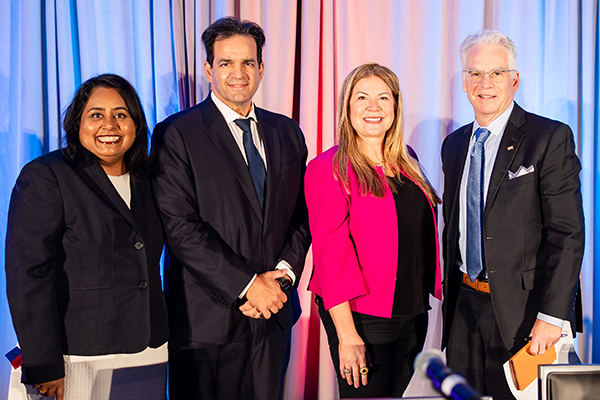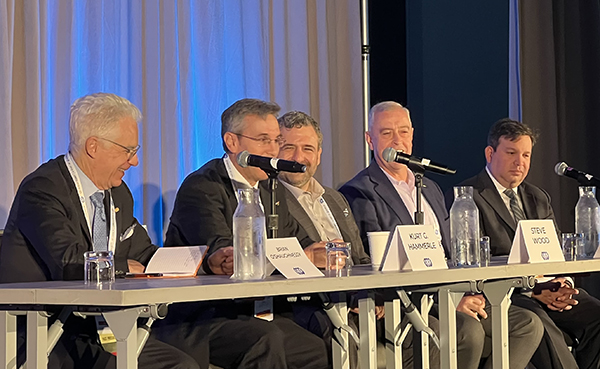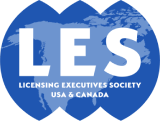The rapidly evolving field of space exploration and technology has opened new frontiers not only for scientific advancement but also for intellectual property (IP) and licensing. The opening session featuring Kathi Vidal, Director of the United States Patent and Trademark Office (USPTO), and Konstantinos Georgaras, Director of the Canadian Intellectual Property Office (CIPO), at the LES 2023 Annual Meeting, shed light on the crucial aspects of IP in Space. Moderated by Brian O’Shaughnessy, former LES President (currently serving as LES SVP, Public Policy), the conversation delved into the future of IP and licensing in the rapidly expanding realm of outer space.

From left, Karthika Perumal, LES President 2022-23; Kathi Vidal, Director of the United States Patent and Trademark Office (USPTO); Konstantinos Georgaras, Director of the Canadian Intellectual Property Office (CIPO); and moderator Brian O’Shaughnessy, former LES President (currently serving as LES SVP, Public Policy).
Space, as a Whole-of-Government Approach
Kathi Vidal began the discussion by saying, “First of all, we’re looking at space as a whole of government approach.” This approach signifies that governments are not only concerned with protecting intellectual property but also exploring opportunities and potential collaborations within the realm of space commerce. Vidal emphasized that the focus extends beyond IP protection; it encompasses broader considerations, including how space endeavors can benefit the country and its allies.
Emerging technologies like artificial intelligence (AI) are central to this discussion. The USPTO recognizes the importance of staying ahead in these areas and shaping policies to address their challenges. They are actively engaging with other government agencies and providing training and site visits for examiners to stay updated on the latest technologies, gaining a deeper understanding of the challenges companies and agencies face in these fields.
Space Law and Regulations
Konstantinos Georgaras, on the other hand, emphasized, “Space is very important for disruptive technologies, and we’re just on the cusp of more commercial use.” He pointed to key players like the James Webb Space Telescope, SpaceX, Blue Origin, and Virgin Galactic as examples of space ventures shaping the industry. In light of this, data and research are vital to staying ahead in the industry.
A pressing issue in space exploration is the question of ownership and inventorship rights. To address this, there is a need for international cooperation. Georgaras mentioned the International Trademark Association in space and proposed extending trademark protocols, like the Madrid Protocol, to cover the entire solar system and the universe. These ideas reflect the need for international agreements and clear regulations in the burgeoning space industry.
Kathi Vidal echoed the importance of international cooperation and said, “It’s imperative we work internationally, make sure we do no harm in space.” The space-adjacent economy, which might not be officially part of the space industry but still significantly impacts its development, should be closely monitored. She encouraged attendees to provide feedback on the USPTO website and anticipate further discussions on these critical topics.
Space Industry Trends and International Agreements
Canada has proactively identified gaps in its space industry policy framework through collaboration with small and medium-sized enterprises. This approach includes studying IP analytics and conducting research in the space sector. By working closely with the Canadian Space Agency, they aim to align their data sets to strengthen their position in the global space arena.
In the United States, an upcoming workshop involving industry and NASA representatives will discuss strategies in light of existing policies, raising questions about the future direction of policy and international agreements. These discussions highlight the dynamic nature of the space industry, where the legal and regulatory frameworks continually evolve to accommodate new technological advances.
International Agreements and Trade Secrets
The U.S. government is trying to establish a commission with China to address commercial issues and improve trade secret protection despite tensions and challenges in the relationship. The collaboration between the USPTO and China’s IP office on green technologies reflects the commitment to fostering global partnerships in the IP realm.
Canada is also engaged in discussions about international agreements, specifically focusing on IP and a cross-government approach. These discussions further emphasize the need for harmonization and cooperation in the global space industry.
Improving Systems for Inclusivity in Innovation
Both the U.S. and Canada are committed to enhancing their patent and trademark systems. The USPTO is taking steps to make the system more inclusive in the U.S. A new welcome letter for patent and trademark applicants, featuring the Deputy Director’s picture and emphasizing support and help, aims to create a more welcoming and accessible system.
Pro bono efforts are being reinforced, focusing on supporting women in the patenting process. Statistics show that 43% of beneficiaries of these services are women, with 35% identifying as African American or Black and 14% as Hispanic.
In Canada, Konstantinos Georgaras seeks to improve dialogue around patent value. The patent office emphasizes the importance of awareness and education for Canadian entrepreneurs. Partnerships in Canada, such as the IP Village model, are being explored to tap into the expertise of the professional and licensing community.
The IP in Space session provided valuable insights into the ever-evolving world of intellectual property within the space industry. International collaboration, dynamic policy development, and efforts to foster inclusivity and innovation are pivotal in addressing the unique challenges and opportunities in this exciting frontier.
IP in Space Workshop!
Following a fireside chat with USPTO Director Vidal and CIPO Canadian Director Georgas, this expert panel led by Brian O’Shaughnessy discussed the practical implications of bringing the world together to craft an IP strategy.

Panel from left: Brian O’Shaughnessy (Dinsmore), Kurt Hammerle (NASA Johnson Space Center), Steven Wood (Vela Wood), Tom Ayres (Voyager Space) and Gil Espinoza (Axiom Space, Inc.).

